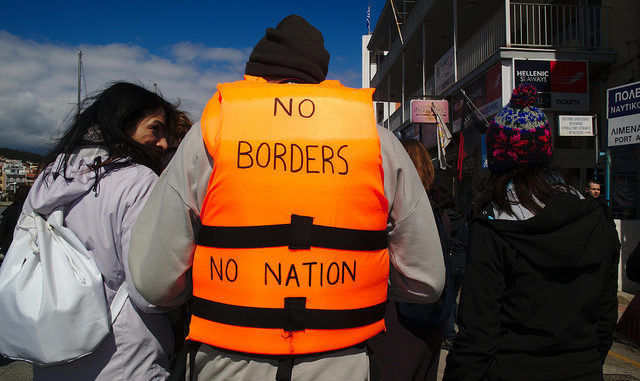
BY: Pinelopi Topali
In 2015 the “refugee crisis” reached the island, and an interest in migration swept the university. Students were fascinated by these strangers coming from the sea, and observed them, sat next to them on buses, or walked with them in the streets. They had heard stories of heroic rescues, which would have made them to want to experience the excitement of saving a life. Dreams of performed humanness entered university classrooms and demands for fieldwork on “the refugees” became common. Initially, this interest seemed an opportunity to talk about the migrants’ point of view, describe their worldviews, contextualize and analyze their experience.
However, things were not so easy. Long ‘detours’ of systematic fieldwork to comprehend the Others or careful observation to grasp a moment of their realities were still unappreciated practices. Solidarian and humanitarian activities, and visits to camps became normal(‑ized) academic practice, a substitute for fieldwork.

The Moria refugee camp, standing just outside the city of Mytilene, was now an academic attraction: “Have you been inside Moria?”, “Can we go to Moria?”, “I took your course so I could visit Moria…”. Increasing voyeurism meant that fieldwork and activism became almost inseparable. Activism became confused with academic practice, as visiting camps to cook, swim with refugees or offer them tea were now termed instantly “fieldwork”. Overcrowded camps situated on European soil attributed to every visitor, both moral and academic worth. Instead of travelling to Morocco to become anthropologists, students and researchers could grab a taxi for Moria and gain the title. Securing access to the camps became an anthropological rite of passage.
I responded to these demands, to some extent bewildered by the dominance of quick-fix ethnographic “reportage”, short fieldtrips, declining ethical standards, and hurried reporting from “the front”. I decided to put a stop to it, only to see students dropping my classes.
Three years have passed and things have changed. The spectacle of “refugees” has now lost its shine. Students have returned to classes to learn about the value of time in anthropological understanding, to study migration theories, and to face –once again– the challenge of the refugees’ point of view. The comprehension of the self by the detour of comprehension of migrants is still difficult. Sometimes it seems more difficult than before, as now Moria seems also to stand more distant from the university. Few students ask for visits to the camp, few wish to cope with the now long-term and normalized misery of the Other. Distance had turned into proximity and back into distance again. Anthropological understanding remains a goal to be reached.
Author: Pinelopi Topali
Position: Assistant Professor
Institution: University of the Aegean, Lesvos, Greece.

Leave a Reply
You must be logged in to post a comment.